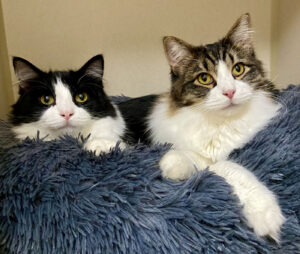
Going outside the litter box (house soiling) is the main reason cat guardians surrender their cats to shelters.
Of all cats euthanized each year in shelters–estimated to be 1.4 million–80% were healthy with treatable conditions. At a conservative 25% returned for house soiling, that’s 280,000 healthy cats who are being euthanized every year for a very treatable problem!
It is a myth that eliminating outside the litter box is normal behavior for a cat. At Happy Cats Haven, we are disproving this myth and solving these issues.
There are three main reasons cats eliminate outside the box:
- They are not spayed or neutered
- They are sick
- They are stressed
At Happy Cats, we spay or neuter every animal we take in to help control feline overpopulation in the Pikes Peak Region. Of course!
The next step is a health exam to evaluate and/or treat illnesses such as parasite imbalances, urinary tract infections, urinary crystals/stones, kidney disease or cystitis.
Research confirms what we observe, that most litterbox issues come from feline stress. Once hormones and illness are ruled out, each cat with this issue needs his or her own separate room. This is where we systematically discover each cat’s triggers and what each needs for normal elimination so each can become adoptable.
In contrast to inside cats, outside cats have untold survival challenges. But one positive trait they do have is unlimited choices for elimination. They choose where, when and how they pee or poop.
Elimination is one of the strongest instinctive behaviors an animal has. Elimination in cats isn’t just internal relief and necessary for survival. It helps them mark and claim territory too, essential to feline mental health.
Domesticating cats has meant severely limiting their elimination choices. We tell them where to go and what to go in with no guarantees we will maintain their cleanliness needs. We force them to live with humans and other animals who make their lives stressful.
We often suddenly surprise them with big setup changes, expecting them to immediately adapt. They do their best to keep up with our erratic behavior, but we often ask more of them than they can give. We humans are the ones setting them up for problems.
With the help of a feline behavior consultant, Happy Cats Haven created our volunteer-based Onsite Behavior Program (OBP) in 2021. We developed three levels of training: basic shy cat handling for all cats, and beginning cat behavior modification and advanced cat behavior modification for extra shy (TLC) cats. We have trained 81 volunteers with basic shy cat handling and 46 volunteers for advanced handling in almost 3 years.
We have a very basic definition of adoptable for our cats and kittens. The cat must recognize its name, have a positive response to petting and be able to be placed or lured into a carrier for transport.
In 2024 alone, we placed 60 cats and kittens into the FBP program, recovered 49 of them and found homes for 43 as of October.
Of those 60 animals, 10 were surrendered for going outside the litter box, making up 17% of our behavior cases. Of those 10 cases, 6 have been solved and gone on to be adopted.

At any given time, Happy Cats Haven has at least a dozen cats on our wait list whose families are desperate to either solve their house soiling issues or rehome them because of that.
Behavior cats have to be worked into the recovery of hundreds of others we constantly rescue and rehome. Each cat has to be isolated to simplify their factors while we systematically work through our Litterbox Checklist that allows the cat to tell us what he or she needs.
These can include: medical treatment, type of box, number of boxes, type of litter, placement of box or boxes, litterbox maintenance, type of food, feeding schedule and especially proximity to other cats. This takes a minimum of 21 days to be assured we have found each cat’s specific litterbox algorithm so they will stay adopted.
This is not an overly complicated process. Like the dog training offered by most mainstream public shelters, solving house soiling just takes commitment, space, training, time and funding to support it.
If you would like to help us save more of these misunderstood animals, you can go directly to our Colorado Gives site to donate.

We have also applied for grants to fund more space and cat care to support taking in more Litterbox Lab kitties!


Recent Comments